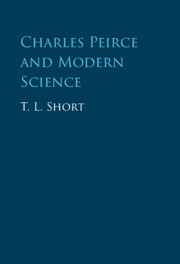Book contents
- Charles Peirce and Modern Science
- Charles Peirce and Modern Science
- Copyright page
- Dedication
- Contents
- Preface
- Acknowledgments
- A Note on Citation of Sources
- Chapter 1 Peirce’s Life in Science: 1859–1891
- Chapter 2 Peirce’s Concept of Science
- Chapter 3 Modern Science Contra Classical Philosophy
- Chapter 4 The Meaning of Pragmatism
- Chapter 5 Misleading Appearances of System
- Chapter 6 Devolution of the Cosmogonic Program
- Chapter 7 Experiments Expanding Empiricism
- Chapter 8 Phaneroscopy and Realism
- Chapter 9 Normative Science
- Chapter 10 Modern Science Contra Modernity
- Bibliography
- Index
Chapter 5 - Misleading Appearances of System
Published online by Cambridge University Press: 26 October 2022
- Charles Peirce and Modern Science
- Charles Peirce and Modern Science
- Copyright page
- Dedication
- Contents
- Preface
- Acknowledgments
- A Note on Citation of Sources
- Chapter 1 Peirce’s Life in Science: 1859–1891
- Chapter 2 Peirce’s Concept of Science
- Chapter 3 Modern Science Contra Classical Philosophy
- Chapter 4 The Meaning of Pragmatism
- Chapter 5 Misleading Appearances of System
- Chapter 6 Devolution of the Cosmogonic Program
- Chapter 7 Experiments Expanding Empiricism
- Chapter 8 Phaneroscopy and Realism
- Chapter 9 Normative Science
- Chapter 10 Modern Science Contra Modernity
- Bibliography
- Index
Summary
Peirce’s early essays have been thought to frame a grand system later developed more fully (’On a New List of Categories’, 1867) and to provide some of that system’s details (the theory of cognition sketched in three 1868–1869 papers). But the formal structure limned was later understood differently: it is an enduring system in appearance only. These essays suggested though they did not consistently express a conceptual idealism in which true thoughts are distinguished from reality by nothing but their incompleteness – a view later contradicted. Yet, with intentional irony, those same essays were in method empirical. Many have damned Peirce’s writings as fragmentary and contradictory, but these would be faults only were he a system-builder. Instead, his conjectures posed obvious problems and were meant to invite inquiries along diverse and mutually inconsistent lines, in which additions and refinements might be made by which those problems can be solved.
Keywords
Information
- Type
- Chapter
- Information
- Charles Peirce and Modern Science , pp. 95 - 124Publisher: Cambridge University PressPrint publication year: 2022
